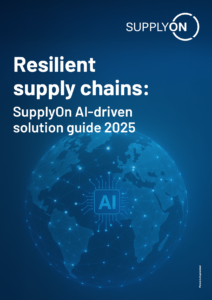
Satisfied Customers
Consistently avoiding errors with complaint management via SupplyOn
Minimizing the number of complaints – both within the company and within the supplier network — as well as rectifying errors quickly and permanently are matters of top priority especially for the automotive industry. Otherwise, it could result in high costs and damage a company’s image. In practice, this task poses considerable organizational and process-related challenges, especially for global companies with complex supplier structures. The Automotive Group at Continental AG has therefore opted for a strategic approach. With complaint management via SupplyOn, a webbased solution from SupplyOn AG, the company is able to manage complaints processes in a standardized, efficient and rigorous manner.
“The highly-dynamic, fiercely-competitive markets in the automotive industry allow no scope for errors. Companies must make a sustainable effort to ensure permanently high quality standards, otherwise they will be penalized by their customers and competitors,” says Markus Rudat, Head of Supplier Quality Management Systems at Continental Automotive. “To maintain our leading position in the market, we also looked for strategic solutions which would allow us to handle complaints processes with our suppliers quickly and efficiently, above all to avoid recurrent errors.”
Given that the company has an international network with thousands of suppliers, Rudat and his team soon realized that a high-performance IT solution would be the only way of achieving this goal. Continental therefore launched a pilot project to introduce SupplyOn’s Problem Solver solution in 2007.
The web-based tool was specially developed to handle complaints processes within the automotive industry. It takes complaint messages from Continental’s internal quality management system and forwards them to suppliers via the SupplyOn platform. The suppliers can then deal with the complaint online in a step-by-step manner using the 8D method, a multi-stage approach already established within the automotive industry, which aims not only to rectify existing errors but also to prevent them from reoccurring. Both Continental and the supplier are continuously informed about the current processing status and receive support until the problem has been solved and all necessary preventative measures are in place.
International rollout
The pilot project was launched at two sites and involved 12 pilot suppliers from the electronic and mechanical sectors. “It was important to involve both supplier groups in the pilot phase as the processes differ considerably. However, the solution must suit the processes of both sectors,” explains Rudat. During this period, Rudat’s team maintained very close contact with the suppliers and closely supervised the implementation of the new processes. It was also important to integrate the supplier into the quality assurance processes more closely and to establish the 8D method as a mandatory joint standard. “Successful complaint management requires active cooperation of the suppliers. Therefore it was important to make the benefits of the solution transparent for both sides.”
After the successful pilot phase, the system was gradually introduced at the Continental Automotive Group’s 15 European plants. Around 400 suppliers are now connected and over 300 complaints are processed via the Problem Solver every month. SQM staff are able to work within their familiar SAP QM environment as the data are automatically transferred to SupplyOn via an interface. Suppliers have direct access to the SupplyOn Problem Solver’s clearly laid-out user interface and can also transfer the data to their own internal systems. As a result, the foundations are laid to ensure an uninterrupted workflow of the complaints processes and to eliminate unnecessary interfaces. “Our aim is to link in all strategic suppliers. What is more, we currently handle just under 50 percent of complaints via SupplyOn and we are looking to further increase this number,” says Rudat.
A leap in quality with complaints processes
The solution is already producing numerous quantitative and qualitative benefits at Continental Automotive. Firstly, handling all processes digitally ensures high data security and quality. Secondly, the fact that the system is available in various languages but the content of the 8D reports is always in English avoids a “Babylonian confusion” and helps to establish a standardized supplier quality management throughout the world.
The quality of the 8D reports has also increased considerably following the introduction of the Problem Solver, because complaint management via SupplyOn requires that content be formulated in an exact, standardized manner. “The solution provides the ideal basis for integrating not only 8D but also other quality management methods such as 5 Why, fishbone diagrams or Drill Deep and Wide. Without the SupplyOn Problem Solver, we would never have been able to adopt this approach, which we call the Conti 8D Plus method, so efficiently,” says Rudat. The positive optimization effects are clearly evident in the company’s figures, too. “By handling complaints electronically, we save a great deal of time and expect to recover the costs of introducing the system in around two years.”
However, the suppliers connected to the system have also benefited since its introduction. They can rely on a standardized complaints procedure and, thanks to the functions available, can handle the 8D process optimally and in a manner which is transparent for everyone involved. Rudat, too, emphasizes the benefits for all partners in the automotive industry: “We have successfully worked with our suppliers to improve quality. The results of this work can be felt by our own customers and ultimately benefit the end customer — the car driver — too.”
You would like to get more information on Complaint Management?
Just enter your contact details and we will get in touch with you as soon as possible.
